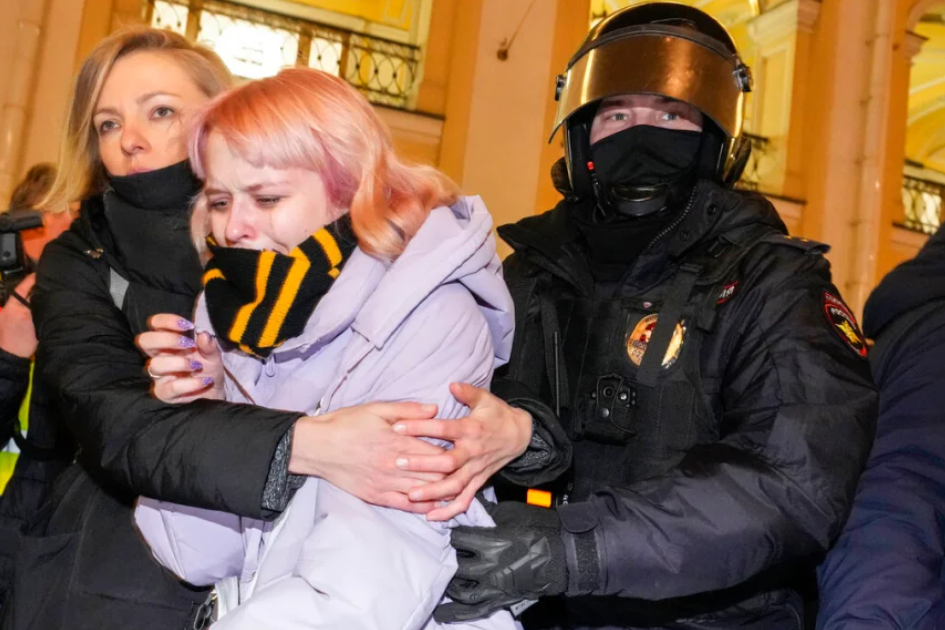
Dmitri Lovetsky/ The Associated Press
Poor Santayana. Most people only remember him by the repeated incantation of his warning that those who choose to ignore history are doomed to repeat it. The man wrote other things, great things, and yet he is forever trapped in the amber of his most popular thought. I suppose, though, that if you have to be known by one thing alone, this is a pretty good one. We are fools if we think that following the same path will bring us to a different destination.
I was thinking about that this week while reading the book “Lara” by Anna Pasternak. Pasternak shares the same last name as the great Russian novelist and poet, Boris Pasternak. He is, in fact, her great-uncle, so she’s perfectly positioned to write the tragic story of his love affair with Olga Ivanovich, the woman who inspired the character of Lara in “Dr. Zhivago.” Boris Pasternak was a proud son of Russia, but he became disillusioned with the excesses of the Bolshevik Revolution and wrote about its destructive aftermath in the famous novel, that almost won him the Nobel Prize. I say “almost,” because the Soviet government forced him to refuse the honor upon risk of being forever exiled from the country that, despite everything, he deeply loved.
Pasternak is one in a long line of proud dissidents, something that Russia has produced with each successive generation. When you live in a country like the United States where freedom of speech is a given (even in these rather Orwellian times where the woke have attempted to seize control of the lexicon and our souls), it is hard to understand just how much courage it takes to speak out against oppression. The Soviet Union, a regime that perfected the art of crushing the individual was, ironically, one of the most effective factories for the sort of human bravery that flourishes in the cold, dark climate on the edge of a philosophical Siberia.
Here is a roll call of names that are painfully familiar to the west: Andrei Sakharov, Yelena Bonner, Anatoli (later Natan) Sharansky, Alexander Solzhenitzyn, Alexander Litvinenko, Anna Politkovskaya, Sergei Magnitsky, Alexey Navalny. These are just a very few of the brave men and women who openly defied their leaders, both under the communist overlords and later, under Putin. While the political configurations have changed, the brutality of the successor regimes has not. Some of the dissidents attacked the repressive nature of the Soviet government and its destruction of civil and human rights, others were motivated by a desire for religious freedom, others were opposed to nuclear war. More recently, those like Litvinenko, Magnitsky, Politkovskaya and Navalny have directed their protests against Vladimir Putin and his dictatorial stranglehold on the Russian people. They have tried to speak truth to the most brutal form of power, and it has resulted in death for most of them, imprisonment for the rest.
Which brings me to what’s happening in the streets of many Russian cities today. Despite the fact that Putin has been successful in censoring the news, to the point that most Russians believe that he’s bombing Ukraine in a noble effort to rid it of “Nazis” (like its Jewish president), there are still ways for skeptical citizens to access accurate information. Many of them understand that what Putin is doing is essentially a genocide, attempting to erase the unique, beautiful, historically distinct people of Ukraine and their homeland from the political geography. And despite the valiant resistance of the Ukrainian people, he will succeed unless the international community intervenes.
In the meantime, the Ukrainians have found courageous allies in their Russian brothers and sisters. In some cases the phrase “brothers and sisters” is literal, because many Ukrainians have family living in Russia. And some of those siblings refuse to believe that their president is in the process of annihilating a sovereign nation. But not everyone.
The descendants of Sharansky, Sakharov and Bonner, all human rights activists, are taking to the streets in protest. The students of Pasternak, Solzhenitzyn and Politkovskaya, all writers, are raising their voices in anger and horror at what is happening on their watch, and supposedly in their name. The colleagues of Litvinenko, Magnitsky and Navalny, all opponents of corruption who were murdered (in the case of the first two) and imprisoned in the case of Navalny, have risked their lives and livelihoods by continuing to counter Putin’s lies with the truth.
The other night, a woman barged onto the set of a Russian news broadcast with a sign that said “No War.” It’s been reported that she was arrested, and interrogated for 14 hours, deprived of food and sleep. She’s fared better than other dissidents, so far. But she has at least continued in the most honorable tradition of the Russian people: courage in the face of tyranny.
You cannot overemphasize the bravery of these people, many of them young but a notable number of them old. There is an institutional memory of what happened during the Soviet Union when voices were silenced and free-thinking minds paralyzed by fear of retribution. The fact that there are protests in the streets is a sign that while you can keep people uninformed, you cannot keep them in ignorance. Injustice finds a way to make itself known to those who refuse to be slaves, and who refuse to digest what we in the United States have tactlessly labeled “fake news.”
In these moments when we justifiably vilify Putin and the Russians who support him, we have to also recognize that there is a sizeable community of heroes, raising their arms, their voices, their hearts and their spirits above the dome of misinformation and lies built by a tyrant. That sort of courage pierces through the densest of barriers, and provides hope that we might yet see an end to this horror.
Because as Santayana said, we are otherwise doomed.
